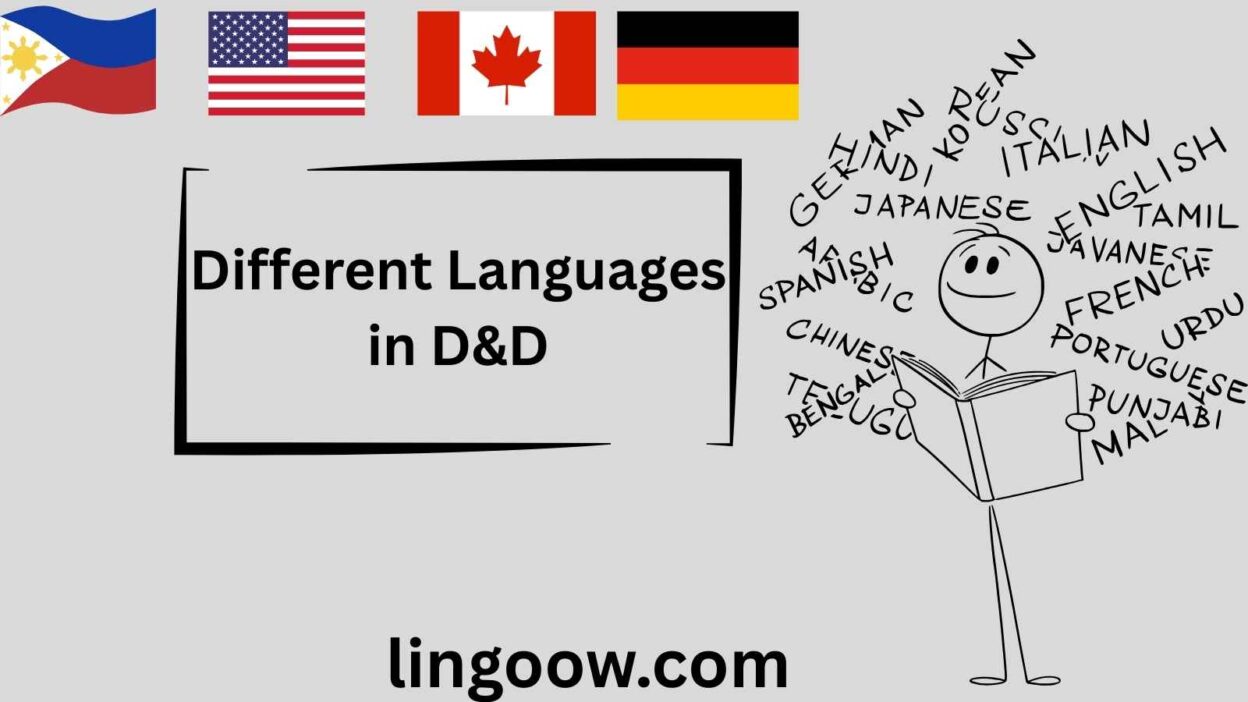Growing up, I remember flipping through my first Dungeons & Dragons (D&D) rulebook, captivated by the idea of crafting stories in fantastical worlds. The phrase “Dungeons & Dragons” itself felt like a magical incantation, evoking images of brave adventurers, mythical creatures, and epic quests. But as I shared this passion with friends from different corners of the world
, I began to wonder: how do you say “Dungeons & Dragons” in other languages? What does this phrase, so iconic to me, mean to others across cultures? The answers revealed a tapestry of linguistic diversity, each translation carrying its own cultural flavor, yet all bound by a universal love for storytelling and adventure.
In this blog post, we’ll embark on a linguistic quest to explore how “Dungeons & Dragons” is expressed in different languages and cultures. From the rolling hills of Europe to the vibrant markets of Asia, the savannas of Africa, and the sacred lands of Indigenous communities, we’ll uncover the beauty of this phrase and its deep connection to the human spirit of imagination.
Reference Table: “Dungeons & Dragons” Across Languages
Below is a table showcasing how “Dungeons & Dragons” is translated or adapted in various languages, along with cultural or linguistic insights.
| Language | Translation/Adaptation | Cultural/Linguistic Insight |
| French | Donjons et Dragons | The direct translation reflects the French love for medieval imagery and fantasy literature. |
| Spanish | Dragones y Mazmorras | “Mazmorras” (dungeons) evokes the mystery of ancient castles, a nod to Spain’s history. |
| Italian | Dadi e Draghi | “Dadi” (dice) emphasizes the game’s core mechanic, resonating with Italy’s gaming culture. |
| German | Dungeons & Dragons | Retains the English name, reflecting Germany’s embrace of global pop culture. |
| Mandarin Chinese | 龙与地下城 (Lóng yǔ dìxià chéng) | “Dragon and Underground City” aligns with Chinese mythology’s reverence for dragons. |
| Hindi | डंगियन्स और ड्रैगन्स (Daṅgiyansa aura ḍraigaṇsa) | Transliterated, maintaining the English sound, showing India’s blend of global and local. |
| Japanese | ダンジョンズ&ドラゴンズ (Danjonzu & Doragonzu) | Katakana transliteration reflects Japan’s adoption of Western fantasy in pop culture. |
| Korean | 던전 앤 드래곤 (Deonjeon aen Deuraegon) | Transliterated, with “Deonjeon” evoking adventure, popular in Korea’s gaming communities. |
| Arabic | الأبراج المحصنة والتنانين (Al-abraj al-muḥaṣṣana w-al-tanānīn) | “Fortified Towers and Dragons” ties to Middle Eastern tales of epic battles. |
| Swahili | Dungeons & Dragons | Often untranslated, reflecting global gaming influence in urban African communities. |
| Zulu | Dungeons & Dragons | Untranslated but embraced in gaming subcultures, symbolizing universal storytelling. |
| Yoruba | Dungeons & Dragons | Adopted as is, with growing popularity in Nigeria’s urban youth culture. |
| Maori | Dungeons & Dragons | Untranslated, but the game resonates with Maori storytelling traditions. |
| Hawaiian | Dungeons & Dragons | Adopted as is, with fantasy themes echoing Polynesian myths of heroes and spirits. |
| Cherokee | Dungeons & Dragons | Untranslated, but the game’s narrative style aligns with Cherokee oral traditions. |
European Languages: Medieval Echoes and Modern Play
In Europe, where castles and knightly tales are woven into the cultural fabric, “Dungeons & Dragons” carries a special resonance. In French, Donjons et Dragons directly translates to “Dungeons and Dragons,” evoking the grandeur of medieval fortresses. French players often see D&D as a continuation of their rich literary tradition, from Arthurian legends to modern fantasy novels.
In Spanish, Dragones y Mazmorras captures the mystique of “mazmorras” (dungeons), a term that conjures images of ancient Iberian castles and labyrinthine prisons. Spanish-speaking communities, particularly in Spain and Latin America, embrace D&D as a way to explore their love for epic narratives and communal storytelling.
Italian takes a unique approach with Dadi e Draghi (“Dice and Dragons”), emphasizing the tactile joy of rolling dice, a central mechanic of D&D. This reflects Italy’s vibrant gaming culture, where board games and role-playing are social events filled with laughter and camaraderie.
In German, the game retains its English name, Dungeons & Dragons, reflecting Germany’s openness to global pop culture. German players often dive deep into the game’s lore, creating intricate campaigns that mirror their meticulous attention to detail, a trait seen in their historical love for strategy games.
Asian Languages: Mythology Meets Modernity
Asia’s linguistic diversity offers a fascinating lens on how “Dungeons & Dragons” is adapted. In Mandarin Chinese, 龙与地下城 (Lóng yǔ dìxià chéng) translates to “Dragon and Underground City.” Dragons hold a sacred place in Chinese mythology, symbolizing power and wisdom, which adds a layer of reverence to the game. Chinese players often infuse D&D campaigns with elements of their own folklore, blending Western fantasy with tales of celestial dragons.
In Hindi, the phrase डंगियन्स और ड्रैगन्स (Daṅgiyansa aura ḍraigaṇsa) is a transliteration, preserving the English pronunciation. This reflects India’s ability to blend global influences with local culture, where D&D is gaining traction among urban youth who see it as a creative outlet in a rapidly modernizing society.
Japanese uses ダンジョンズ&ドラゴンズ (Danjonzu & Doragonzu), a katakana transliteration that captures the game’s foreign allure. Japan’s love for role-playing games, from video games like Final Fantasy to tabletop D&D, makes it a natural fit, with players often incorporating anime-inspired aesthetics into their campaigns.
In Korean, 던전 앤 드래곤 (Deonjeon aen Deuraegon) similarly transliterates the name, aligning with South Korea’s thriving gaming culture. D&D communities in Seoul and beyond are known for their vibrant, tech-savvy approach, often streaming their sessions online.
In Arabic, spoken across over 20 countries, الأبراج المحصنة والتنانين (Al-abraj al-muḥaṣṣana w-al-tanānīn) translates to “Fortified Towers and Dragons.” This evokes the rich storytelling traditions of the Middle East, from One Thousand and One Nights to modern fantasy. Players in countries like Egypt, Saudi Arabia, and the UAE often weave tales of djinn and desert quests into their D&D games.
African Languages: Storytelling in the Heart of the Continent
Africa’s linguistic landscape is as diverse as its cultures, and while “Dungeons & Dragons” is often untranslated in many regions, its spirit resonates deeply. In Swahili, spoken across countries like Kenya, Tanzania, and Uganda, the game is typically referred to as Dungeons & Dragons. Urban gaming communities in East Africa embrace it as a modern extension of their oral storytelling traditions, where tales of heroes and mythical creatures are passed down through generations.
In Zulu, spoken in South Africa, the name remains untranslated, but D&D’s collaborative storytelling aligns with the communal values of Ubuntu, emphasizing togetherness. Zulu players often bring their rich mythology, including tales of ancestral spirits, into their campaigns.
Yoruba, spoken in Nigeria and Benin, also adopts Dungeons & Dragons as is. The game’s rise in Lagos reflects a growing interest among young Nigerians in global pop culture, with campaigns often infused with Yoruba deities like Ogun or Shango, blending fantasy with cultural pride.
Across over 20 African countries, from Ethiopia to Ghana, D&D is gaining a foothold, often untranslated but deeply localized through the stories players tell, reflecting the continent’s vibrant narrative traditions.
Indigenous & Island Languages: Sacred Stories and Fantasy
Indigenous and island languages offer unique perspectives on “Dungeons & Dragons.” In Maori, spoken in New Zealand, the game is untranslated, but its storytelling resonates with Maori oral traditions, where tales of gods like Tāne and heroes like Māui are central. Maori players might incorporate their cosmology into campaigns, creating adventures set in ancestral lands.
In Hawaiian, Dungeons & Dragons is also adopted as is, but the game’s themes of heroism and exploration echo Polynesian myths of voyagers navigating the Pacific. Hawaiian players often craft campaigns inspired by their island’s history and spiritual beliefs.
Cherokee, spoken in parts of the United States, retains the English name. The game’s narrative structure aligns with Cherokee storytelling, where tales of the Trickster Rabbit or the Great Spirit are passed down. D&D provides a modern medium for these ancient traditions.
In Samoan, spoken in Samoa and American Samoa, the game is untranslated but embraced as a way to connect with global youth culture. Samoan players might weave fa’a Samoa (the Samoan way) into their games, emphasizing family and community.
Across over 20 countries with Indigenous and island communities, from Australia’s Aboriginal languages to the Philippines’ Tagalog, D&D is a bridge between traditional storytelling and modern fantasy, uniting diverse cultures through shared imagination.
Cultural Insights: The Evolution of “Dungeons & Dragons”
The phrase “Dungeons & Dragons” was coined in 1974 by Gary Gygax and Dave Arneson, drawing from Western fantasy tropes like medieval dungeons and mythical dragons. Over time, it has evolved into a global phenomenon, transcending its American roots. In Europe, it taps into a fascination with medieval history; in Asia, it resonates with ancient mythologies; in Africa, it aligns with oral traditions; and in Indigenous communities, it mirrors sacred storytelling.
Historically, the concept of dungeons—dark, mysterious places—appears in many cultures, from the labyrinths of Greek mythology to the underground cities of ancient China. Dragons, too, are universal, symbolizing power in the West and wisdom in the East. The game’s name, therefore, carries a timeless quality, adaptable to countless cultural contexts.
Proverbs and Sayings: Wisdom Through Fantasy
Here are some proverbs and sayings inspired by the themes of “Dungeons & Dragons” across cultures:
- French: “Un dragon dort dans chaque cœur.” (A dragon sleeps in every heart.) — Reflects the belief that everyone has untapped potential for greatness.
- Chinese: “龙飞九天,地下无惧。” (The dragon soars in the nine heavens, fearless of the depths.) — Emphasizes courage in facing challenges.
- Swahili: “Hadithi ni daraja la roho.” (Stories are the bridge of the soul.) — Highlights the power of storytelling to connect people.
- Maori: “Ka rere te moemoeā ki ngā whetū.” (Dreams soar to the stars.) — Reflects the limitless imagination of D&D.
These sayings, while not always directly tied to D&D, capture the game’s spirit of adventure, courage, and storytelling.
FAQs
Why does “Dungeons & Dragons” sound similar in many languages?
Many languages adopt the English name or transliterate it due to the game’s global popularity and the lack of direct translations for “dungeons” or “dragons” that fully capture the fantasy context. This reflects D&D’s status as a cultural export.
What’s the oldest known usage of the phrase?
The phrase “Dungeons & Dragons” originated in 1974 with the game’s first edition, but the concepts of dungeons and dragons draw from ancient mythologies, like European folklore and Chinese dragon legends.
How do cultural differences affect the expression of D&D?
Each culture infuses D&D with its own myths and traditions. For example, Japanese players might create campaigns with samurai-inspired characters, while African players might incorporate ancestral spirits, making each game a unique cultural expression.
Conclusion: The Universal Quest
“Dungeons & Dragons” is more than a game; it’s a universal language of imagination, uniting people across continents and cultures. Whether it’s Donjons et Dragons in France, 龙与地下城 in China, or simply Dungeons & Dragons in Maori communities, the phrase evokes a shared passion for storytelling and adventure. Its power lies in its ability to adapt, allowing players to weave their own histories, myths, and dreams into the game.
What’s your story? How do you say “Dungeons & Dragons” in your language, and what does it mean to you? Share your experiences in the comments below, and let’s continue this epic quest together!




